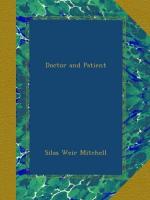From the public we can look for no such justice, and our professional manners forbid us to speak of our brethren, save among ourselves, with perfect freedom. As a profession, it is my sincere conviction that in our adherence to a high code of moral law, and in the general honesty with which we do our work, no other profession can be compared with ours. Our temptations, small and large, negative and positive, are many and constant, and yet I am quite sure that no like group of men affords as few illustrations of grave moral weaknesses. It is commonplace to say that our lives are one long training in charity, self-abandonment, all forms of self-restraint. The doctor will smile at my thinking it needful to even state the fact. He begins among the poor; all his life, in or out of hospitals, he keeps touch of them always. He sells that which men can neither weigh nor measure, and this sets him over all professions, save one, and far above all forms of mere business. He is bound in honor to profit by no patent, to disclose all he has learned, and to give freely and without reward of his best care to all others of his profession who may be sick. What such a life makes of a man is largely a question of original character, but in no other form of occupation is there such constant food useful to develop all that is best and noblest.
Popular opinion has been prone to decide that the physician who is anything else than this is a person not to be trusted. The old axiom is too often quoted as concerns us, “Jack of all trades, master of none.” But there are enough men who have the power to be master of many trades and passed master of one. It is a question of applicative energy. Few men in early life can do much more than is needed to learn our art and its sister sciences; but, as time goes on, there are many who can add to it other pursuits which greatly benefit them in a wide sense, and enlarge and strengthen their mental powers, or pleasantly contribute to the joys of life, and so even to the growth of a man’s moral nature. The wise physician, who is fond of etching or botany, the brush, or the chisel or the pen, or who is given to science, does well to keep these things a little in the background until he is securely seated in the saddle of professional success. Then usually he may feel free to reasonably follow out his tastes, and to write, or in any other way insist on freedom to use or make public his results. If only he has the competent fund of persistent industry to draw upon, he will be not the worse, but the better, physician for such enlargement of his pursuits as I refer to, for we may feel sure that in my profession there is room for the direct or indirect use of every possible accomplishment.




